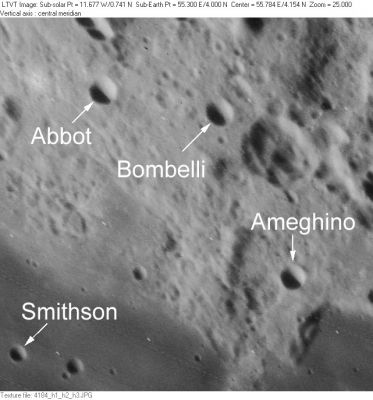Difference between revisions of "Abbot"
| Line 16: | Line 16: | ||
==Additional Information== | ==Additional Information== | ||
* IAU page: [http://planetarynames.wr.usgs.gov/Feature/10 Abbot] | * IAU page: [http://planetarynames.wr.usgs.gov/Feature/10 Abbot] | ||
| − | * Depth data from [http://the-moon.us/wiki/Kurt%20Fisher% | + | * Depth data from [http://the-moon.us/wiki/Kurt%20Fisher%20Crater%20Depths Kurt Fisher database] |
** Westfall, 2000: 2.7 km | ** Westfall, 2000: 2.7 km | ||
* Included in [http://the-moon.us/wiki/ALPO%20list%20of%20banded%20craters ALPO list of banded craters] | * Included in [http://the-moon.us/wiki/ALPO%20list%20of%20banded%20craters ALPO list of banded craters] | ||
Latest revision as of 18:42, 15 April 2018
Contents
Abbot
| Lat: 5.5562°N, Long: 54.7431°E, Diam: 10.4043 km, Depth: km, Rükl |
LO-IV-184H This small field straddling the northeast edge of Mare Fecunditatis includes the four IAU-approved crater names Abbot, Ameghino, Bombelli and Smithson. The relatively large, complex crater to the southeast of Bombelli is Apollonius A.
Images
LPOD Photo Gallery Lunar Orbiter Images Apollo images
LROC view
Maps
(LAC zone 62D1) LAC map Geologic map LM map LTO map
Description
Wikipedia
Additional Information
- IAU page: Abbot
- Depth data from Kurt Fisher database
- Westfall, 2000: 2.7 km
- Included in ALPO list of banded craters
Nomenclature
- Named for Charles Greeley Abbot (May 31, 1872– December 17, 1973), an American astrophysicist, astronomer and Secretary of the Smithsonian Institution.
- Apollonius K, the former name attributed to Beer and Mädler, had been Catalog number 78 in the Collated List and Named Lunar Formations.
- This crater was re-named in 1973 to honor Abbot's 100th birthday (IAU Transactions XVB). Since the release of the original IAU nomenclature in 1935 (which included several), it is one on the very few craters to be named for a then-living person. The only other exceptions seem to be the twelve names assigned to honor living astronauts and cosmonauts. - Jim Mosher
- Misspelled as Abbott on Map 3 in The Hatfield Photographic Lunar Atlas (Springer, 1999).- DannyCaes Jan 26, 2013
Mishqui Basin
- The flat unnamed area north-northeast of Abbot is unofficially known as the Mishqui Basin. This name was printed on the greenish Rand McNally moonmap and on the same moonmap in Patrick Moore's Atlas of the Universe (1983). The exact origin of this unofficial name is still unknown. Who was Mishqui?
- For a list of other mysterious names on these moonmaps, see Rand McNally. - DannyCaes Sep 1, 2015
LPOD Articles
Bibliography
Note:
Flemish and Dutch readers should be aware of the appearance of C. G. Abbot in Julien Weverbergh's most interesting book on natural luminous phenomena (1980, Ankh-Hermes). Unfortunately, this book was (and still is) almost always located at the shelves of the category "esoterics" because of its name: UFO's In Het Verleden (UFO's In The Past). WARNING: this is not the umpteenth book on "flying saucers", this book is totally different! It is a valuable appendix to William R. Corliss's book Lightning, Auroras, Nocturnal Lights, and related luminous phenomena (The Sourcebook Project, 1982), and much, MUCH more! - DannyCaes Apr 15, 2015
C. G. Abbot in the Sourcebook Project (William R. Corliss)
- In Lightning, Auroras, Nocturnal Lights, and related luminous phenomena (1982) :
- GLL2-R17 (Bead Lightning), GLL24-R1 (Tubular Lightning), and GLL25-R1 (Meandering Lightning): Remarkable Lightning Photographs (Smithsonian Miscellaneous Collections, 1934).
- In Tornados, Dark Days, Anomalous Precipitation, and related weather phenomena (1983) :
- GWS1-R16 (The Correlation of Lunar Phase and Terrestrial Weather): Precipitation Cycles (Science, 1949).
- In Mysterious Universe, a handbook of astronomical anomalies (1979) :
- Page 67: The Closing of a Famous Astronomical Problem (about the so-called intramercurial planet called Vulcan) (W.W.Campbell, Popular Science Monthly, 1909).
Named Features -- Prev: Abbe -- Next: Abel
